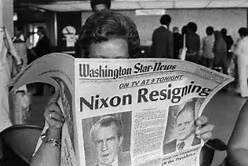 One thing that can be said for the presidency of Donald J. Trump: it has not been boring. The 45th president’s tendency to exaggerate (crowd size at his inauguration), to spread obvious falsehoods (millions of illegal voters who all voted for Clinton), to make promises he apparently has no intention of keeping (releasing tax returns, passing a health care bill that will provide health care for all, bringing back record numbers of jobs, especially in the coal and steel industries), and just general creepiness (the rough handshakes, the holding hands–no, not holding hands–with his wife Melania, the excessive personal phone calls and meetings with legal and law enforcement officials) and so many other unfortunate and even outrageous behaviors, combined with the “failed” Travel Ban, Tax Cut Bill and Health Don’t-Care Act, would be enough in the opinion of many of our associates to merit impeachment on the basis of incompetence and mendacity alone. But this president seems intent on adding historical, political and legal precedent as another log on the fire that may consume his presidency. He seems to have “checked” practically every “box” on the Classic Nixonian Watergate Scandal Checklist.
One thing that can be said for the presidency of Donald J. Trump: it has not been boring. The 45th president’s tendency to exaggerate (crowd size at his inauguration), to spread obvious falsehoods (millions of illegal voters who all voted for Clinton), to make promises he apparently has no intention of keeping (releasing tax returns, passing a health care bill that will provide health care for all, bringing back record numbers of jobs, especially in the coal and steel industries), and just general creepiness (the rough handshakes, the holding hands–no, not holding hands–with his wife Melania, the excessive personal phone calls and meetings with legal and law enforcement officials) and so many other unfortunate and even outrageous behaviors, combined with the “failed” Travel Ban, Tax Cut Bill and Health Don’t-Care Act, would be enough in the opinion of many of our associates to merit impeachment on the basis of incompetence and mendacity alone. But this president seems intent on adding historical, political and legal precedent as another log on the fire that may consume his presidency. He seems to have “checked” practically every “box” on the Classic Nixonian Watergate Scandal Checklist.
We have attempted to cover as many of the similarities between the Trump presidency and the ultimate demise of the Nixon administration as we could. More than likely, there will be more before long that we may not have considered, perhaps a re-enactment of some of the scenes detailed in The Final Days, which was written to chronicle the end of Nixon.
For those of you who get off on political theater, hang onto your hats.
“I Am A Friend to the Blacks … We Are A Law-and-Order Presidency”
Trump, like Nixon, has attempted to curry favor with Afrikan-Americans with high-profile events such as visits to Trump Tower from Steve Harvey, Ray Lewis and Kanye West; by appointing a few Black “representatives” in his circle like Omarosa Manigault (whose most visible act as director of “African-American outreach” has been to denounce Blacks for failing to give Trump a chance to win them over) and Dr. Ben Carson (who has yet to show any aptitude at all for housing,  despite being tabbed to run that agency); and for his grand but empty proclamations of being the “least racist person you will ever meet” in press conferences, but little else. Meanwhile, Trump has taken on a disturbingly Nixonian “law-and-order” stance, as he has made one public statement after another that he will be the best friend of “the Blacks” and that he will also end the “carnage” that inflicts the inner cities, but his policies indicate that his “solution” is to further empower police and insist that we give them our respect instead of regulating their actions to build respect in the communities they patrol. One of the most detestable actions Trump has taken in this vein is his policy of encouraging Attorney General Jefferson Beauregard Sessions III to rescind consent decrees with cities that still reel from the after-effects of police violence against unarmed Afrikan-Americans.
despite being tabbed to run that agency); and for his grand but empty proclamations of being the “least racist person you will ever meet” in press conferences, but little else. Meanwhile, Trump has taken on a disturbingly Nixonian “law-and-order” stance, as he has made one public statement after another that he will be the best friend of “the Blacks” and that he will also end the “carnage” that inflicts the inner cities, but his policies indicate that his “solution” is to further empower police and insist that we give them our respect instead of regulating their actions to build respect in the communities they patrol. One of the most detestable actions Trump has taken in this vein is his policy of encouraging Attorney General Jefferson Beauregard Sessions III to rescind consent decrees with cities that still reel from the after-effects of police violence against unarmed Afrikan-Americans.
President Richard Milhous Nixon signed the Voting Rights Act extension on June 22, 1970, which to some is an indication of the “progressive side” of Nixon’s policies, even though some critics state that Nixon was practically forced to sign the Civil Rights Act extension due to political and legal pressure. At the same time, however, Nixon preached a “law and order” mantra that was seen by progressive and Pan-Afrikan activists as a not-so-covert campaign to bolster the White Supremacist institutions that held power in the Deep South since before the Civil War. Nixon’s “law-and-order” stance provided great power to racist police departments across the country, a move that was replicated by Ronald Reagan when he took power in 1980 and, now, apparently, by Trump in 2017 as he works to “make America great again”.
Leah Mickens wrote about how “law-and-order” politics served White Supremacist interests more than true law and true order in the August 8, 2014 edition of Salon, R.I.P. “Law and Order” conservatives: Why Nixon’s party abandoned his obsession (http://www.salon.com/2014/08/08/r_i_p_law_and_order_conservatives_why_nixons_party_abandoned_his_obsession/). The whole article is instructive, but we include some excerpts here:
Richard Nixon’s long quest for the White House resulted in a 1968 triumph, due in part to a stated commitment to reestablishing “law and order.” Nixon famously claimed that he represented the “silent majority” of middle-class white Americans who were tired of the protests, riots and youth militancy that had come to dominate the cultural landscape in the late 1960s. Key to the “law and order” rhetoric was his promise to restore respect for traditional authority, especially toward the police, who were called “pigs” and worse by young adults in the antiwar, hippie and black power movements.
In the 46 years since the 1968 election, American conservatism has undergone a radical transformation with regard to its relationship to authority. Rather than encourage deference to lawful authorities, modern-day conservatives, particularly those in the Tea Party movement, regularly boast of their refusal to respect what they believe to be the illegitimacy of the federal government. Conservative media outlets, from Fox News to talk radio to blogs, regularly provide their audiences with breathless accounts of how the government is planning to imprison conservative activists, how the Affordable Care Act is “destroying religious liberty,” or how President Obama is secretly allied with the Muslim Brotherhood or the Communist Party. …
Given this background, it should be obvious that the so-called silent majority was only in favor of “law and order” when the legal system was rigged to favor white supremacy. When the legislation was passed to end de jure segregation and attempt to redress some of the injustices it caused (e.g., affirmative action, school desegregation orders, SNAP), conservatives suddenly decided that the government was illegitimate. The rise of the Tea Party after the election of Barack Obama is not coincidental.
The bulk of conservative violence has never been committed by lynch mobs or Klansmen, but by the silent majority who preferred to maintain their “way of life” at the expense of civil rights and basic human decency … The very silence of the silent majority shows that they ultimately cared little about law or order, but about maintaining their exalted position in American society.
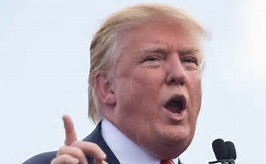 Trump’s “law-and-order” pronouncements sound like the same dog-whistle. His inaugural speech made graphic reference to the “carnage” that he seems to think has saturated the inner cities, that “previous administrations” (apparently referencing Obama’s) had neglected, and which, under a Trump White House, “ends right here and ends right now.” Of course, he didn’t wait until the inauguration to blow that whistle, and blow it loudly.
Trump’s “law-and-order” pronouncements sound like the same dog-whistle. His inaugural speech made graphic reference to the “carnage” that he seems to think has saturated the inner cities, that “previous administrations” (apparently referencing Obama’s) had neglected, and which, under a Trump White House, “ends right here and ends right now.” Of course, he didn’t wait until the inauguration to blow that whistle, and blow it loudly.
A July 18, 2016 Huffington Post article by Howard Fineman, Trump’s Campaign Manager Says He’ll Channel ‘Law And Order’ Richard Nixon, at http://www.huffingtonpost.com/entry/donald-trump-richard-nixon-rnc_us_578cda12e4b0fa896c3f2b2e, reported on Trump’s plan for his acceptance speech at the 2016 Republican National Convention as follows:
As Donald Trump searched for a template for his acceptance speech, the model he chose was Richard Nixon’s infamous 1968 “law and order” speech on behalf of a silent and sullen middle class.
At a somewhat similar time of stress and struggle in America and the world, Trump chose that speech as a starting point, his campaign chief told reporters at a Bloomberg breakfast Monday morning.
“We started on the speech a couple of weeks ago,” said Trump campaign chairman Paul Manafort. “We looked at previous conventions speeches; the one he focused on, though, was Nixon in 1968.”
In that speech, given only months after the assassinations of Martin Luther King Jr. and Robert F. Kennedy and amid rioting in many U.S. cities, Nixon cited the fears and resentments of “forgotten Americans” and vowed to return “order” to the streets and country.
The aim was not to “unite” America, as Nixon claimed, but to target enough white middle-class support (as well as support from a smattering of other groups) to win.
Another article on July 18, 2016 by Josh Zeitz in Politico, How Trump is Recycling Nixon’s Law-And-Order Playbook (http://www.politico.com/magazine/story/2016/07/donald-trump-law-and-order-richard-nixon-crime-race-214066) made a similar point:
In the wake of recent tragedies in Dallas and Baton Rouge, where eight police officers have been gunned down in the space of just one week, and with clear reference to terrorist attacks in Europe and the Middle East, Donald Trump’s campaign has signaled his determination to make the GOP the “law-and-order party.” Indeed, the theme for the opening night of the Republican National Convention is “Make Our Country Safe Again.”
Safe from what? By almost any measure, the United States is safer than it has been in decades. Notwithstanding localized spikes in urban homicides, for the past decade the crime and violent crime rates have hovered at near-50 year lows. And despite the recent tragedies in Dallas and Baton Rouge, the same is true of the number of police officers killed in the line of duty.
If the country is calm by comparison, why would Trump sound a cry for “law and order” once again? The answer may lie with the first successful soothsayer of the “Silent Majority,” Richard Nixon, who in 1968 created the very playbook that Trump seems to be recycling. Nixon came to power in an era of profound discord, marked by urban riots, anti-war protests (some, violent), and an unraveling of longstanding social and cultural mores. Then as now, crime was a powerful proxy for other concerns. But even with all that to worry about, Nixon’s appeal wasn’t just about crime. His political insight was that crime was a powerful proxy for other anxieties.
For a quarter-decade, Republican candidates adopted Nixon’s subtle but discernable brand of backlash politics. As crime rates plummeted in the 1990s, and as America became a more racially and culturally diverse country, the old politics no longer worked. Yet Trump has reactivated them—and to what effect, we don’t yet know.
The Company You Keep
Barely 150 days into his presidency, Trump has seen his staff’s human resources operation begin to resemble a revolving door. Gone are campaign strategists Corey Lewandowski and Paul Manafort, Communications Director Mike Dubke and National Security Adviser Mike Flynn. Some 440 top staff positions in the Trump administration remained unfilled as of mid-June. Several potential candidates for positions such as FBI director have removed themselves from consideration, some 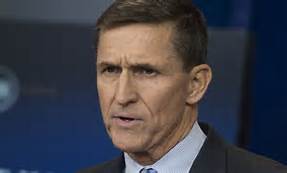 before they were even asked. And those who remain have often been referred to as “extremists” (such as Steve Bannon) or as extremely naïve for allowing their generally good reputations to be potentially damaged by association with them (such as Defense Secretary James Mattis).
before they were even asked. And those who remain have often been referred to as “extremists” (such as Steve Bannon) or as extremely naïve for allowing their generally good reputations to be potentially damaged by association with them (such as Defense Secretary James Mattis).
Meanwhile, what Trump has called a “witch hunt” has apparently taken on some steam, with speculation that former National Security Adviser Flynn could be potentially charged with felonies for his having served as an unreported foreign agent for Turkey and his repeated contacts with Russian officials. In addition, Attorney General Jefferson Beauregard Sessions III has been found to have engaged in more frequent contacts with Russian diplomats and other officials that was previously reported. Combined with Manafort’s already known connections with Russian oligarchs, and the “witch hunt” complaints seem less credible by the day.
The parallels to Nixon’s administration most famously include the corruption investigation of his vice president, Spiro Agnew, for bribery and tax issues while Agnew had been Baltimore County (Maryland) Executive, Governor of the State of Maryland and Vice President, which forced Agnew to plead “no contest” to the criminal charges and resign the vice presidency in 1973. Such corruption, so close to a president and administration that had loudly proclaimed itself as an advocate of “law and order”, should have occurred to Trump as he was making similar claims while closely associating with political operatives who appear to have multiple skeletons in their closets.
Do I Have Your Loyalty?
The allegations that Trump was attempting to manipulate the investigation into the Russian “hacking” of the November 2016 elections and the possible collusion of Americans, including those in the Trump campaign, gained a bit of steam when now-former FBI director James Comey made the claim that Trump had, in one of what Comey would call several “uncomfortable” meetings, asked for Comey’s “loyalty”. (Justice Department lawyer Preet Bahrara would mention his refusal to take a personal call from Trump as a possible reason behind his abrupt firing the next day.) Comey’s response, according to his statement, was that he answered that Trump had his “loyal honesty”, which Trump allegedly tried to rephrase as “honest loyalty”. In the days immediately after Comey’s June 8 testimony before the Senate Intelligence 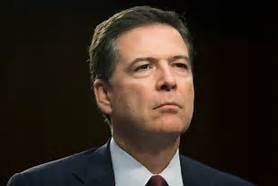 Committee, Trump mocked the very idea that he would ask for a “loyalty oath” from the members of his Cabinet or other high-level employees. Questions regarding loyalty oaths would be asked of Department of National Intelligence head Dan Coats, Acting FBI Director Andrew McCabe, Assistant Attorney General Rod Rosenstein and NSA Director Michael Rogers. These questions, however, apparently delved into areas of national security, for the witnesses refused to answer the questions in open session.
Committee, Trump mocked the very idea that he would ask for a “loyalty oath” from the members of his Cabinet or other high-level employees. Questions regarding loyalty oaths would be asked of Department of National Intelligence head Dan Coats, Acting FBI Director Andrew McCabe, Assistant Attorney General Rod Rosenstein and NSA Director Michael Rogers. These questions, however, apparently delved into areas of national security, for the witnesses refused to answer the questions in open session.
Trump’s apparent need for “loyalty oaths” would seem to be an expression of his paranoia. The recently-popular suspicion of the existence of a “Deep State”, which is often used by right-wing pundits to describe a “shadow government” through which the intelligence agencies (and former president Barack Obama, supposedly hiding in some secure bunker near the White House, ready to pounce and reassert his “regime”) would attempt to overrule the Trump administration, was actually inspired at least as far back as 1960, when Nixon was defeated in the 1960 presidential election, and which Nixon had described as “an Ivy League, liberal bastion of counter-reaction against the right”. This would explain why, with all the evidence that Russia had been working to influence and disrupt the November 2016 elections, Trump has not commented on the seriousness of this situation, instead preferring to emphasize that the most important issue is that of “the leaks” being perpetrated by political opponents, and even accusing Comey of being the “Leaker in Chief” after it was disclosed that Comey had written memos about his personal discussions with Trump.
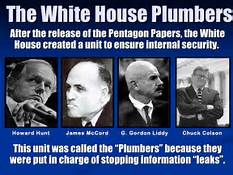 Nixon’s paranoia was not specifically demonstrated by loyalty oaths, but as the political pressure on him mounted, he began recording conversations in the White House, he increasingly railed against the “leakers” of information in his administration, he allowed the development of an “Enemies List”, and he suggested the creation of a team that would be responsible not so much for his physical safety but for protecting him politically from his enemies. This group would ultimately morph into the “Plumbers” (apparently because they would “plug leaks in the a
Nixon’s paranoia was not specifically demonstrated by loyalty oaths, but as the political pressure on him mounted, he began recording conversations in the White House, he increasingly railed against the “leakers” of information in his administration, he allowed the development of an “Enemies List”, and he suggested the creation of a team that would be responsible not so much for his physical safety but for protecting him politically from his enemies. This group would ultimately morph into the “Plumbers” (apparently because they would “plug leaks in the a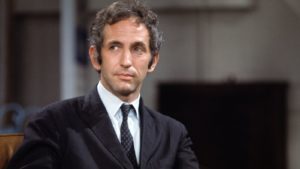 dministration”), the group that would break into the office of the psychiatrist of Daniel Ellsberg in 1971 after Ellsberg had published The Pentagon Papers, which exposed multiple examples of corruption in the prosecution of the Vietnam War. The Plumbers would be used once more, in the 1972 Watergate break-in that would ultimately end Nixon’s presidency.
dministration”), the group that would break into the office of the psychiatrist of Daniel Ellsberg in 1971 after Ellsberg had published The Pentagon Papers, which exposed multiple examples of corruption in the prosecution of the Vietnam War. The Plumbers would be used once more, in the 1972 Watergate break-in that would ultimately end Nixon’s presidency.
The Press is the Enemy
“Never forget, the press is the enemy, the press is the enemy,” Nixon is reported to have said in one of the White House tapes, according to the Guardian. Does it sound familiar? “The FAKE NEWS media (failing @nytimes, @NBCNews, @ABC, @CBS, @CNN) is not my enemy, it is the enemy of the American people!”
Rob Samuelson created an informative slide show entitled How Nixon’s paranoia, obsession with enemies and leaks led to his downfall, available at http://latimes-politics-chatter.latimes.com/politics-talk/slideshow/how-nixons-paranoia-obsession-enemies-leaks-downfall/, which explains much of the Nixon paranoia, a lens through which we can examine the increasingly paranoid statements and actions by Trump.
Tapes, or No Tapes?
After Trump fired Comey as FBI director, on May 12 the president went to Twitter, appearing to issue a threat that “James Comey better hope that there are no ‘tapes’ of our conversations before he starts leaking to the press!” This, of course, led to two further developments in this case which Trump, perhaps, did not anticipate: (1) 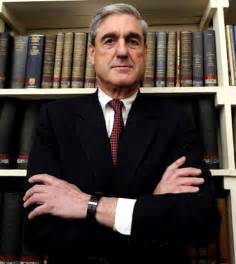 Comey immediately wrote a report, or “contemporaneous notes”, as media analysts called them, describing the most recent meeting he had held with Trump, and began making arrangements to have the report and previous similar ones released to the public if needed; and (2) the Senate Intelligence Subcommittee itself made preparations to seek out these “tapes” themselves. Meanwhile, media outlets took to obsessing over the topic, and it’ became likely that Special Counsel Robert Mueller would attempt to obtain any “tapes” that actually do exist through the subpoena process.
Comey immediately wrote a report, or “contemporaneous notes”, as media analysts called them, describing the most recent meeting he had held with Trump, and began making arrangements to have the report and previous similar ones released to the public if needed; and (2) the Senate Intelligence Subcommittee itself made preparations to seek out these “tapes” themselves. Meanwhile, media outlets took to obsessing over the topic, and it’ became likely that Special Counsel Robert Mueller would attempt to obtain any “tapes” that actually do exist through the subpoena process.
The reference to “tapes” sounds disturbingly like the “Nixon tapes”, which the then-president chose not to destroy because, for some reason, he thought they might benefit his cause were he to come under political or legal attack. They did not. A half-hearted attempt to erase 27 minutes of what he may have deemed the most incriminating portions of those tapes only led to the conclusion that Nixon was attempting to cover up the crimes of his presidency. Nixon would be impeached by Congress, and he would resign the presidency in disgrace scantly a year after his resounding re-election victory.
Now, of course, after the Senate Intelligence Committee has stated their intent to obtain any recordings that may have been made, the Secret Service has stated that there were no recordings made of any conversations in the Trump White House. This does not mean that Trump could not have made recordings without even notifying the Secret Service, given his penchant for uttering outbursts against the certain advice of his lawyers and staff, and for contradicting the official public statements of his Secretary of State and other administration officials. Was Trump lucky, was his tweet at Comey about “better hope there are no ‘tapes'” truly just blowing smoke, or have whatever tapes that may have been created already been destroyed?
Stonewalling
During the Senate hearings on June 6, Department of National Intelligence Director Dan Coats, Acting Assistant Attorney General Rod Rosenstein, NSA Director Michael Rogers and acting FBI Director Andrew McCabe consistently dodged questions from 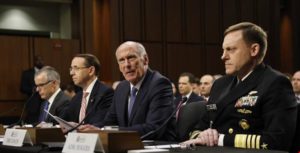 the Senate panel, claiming that the questions could not be answered in “public session” because they touched on classified information or on issues of national security.
the Senate panel, claiming that the questions could not be answered in “public session” because they touched on classified information or on issues of national security.
This clearly irritated several of the senators, who repeatedly grilled all four of the expert “witnesses” in an effort to elicit some answers from them regarding the nature of the surveillance that is routinely collected, the information available on Russian influence on the 2016 presidential election, the possible involvement of American citizens in the Russian “hacking” of the 2016 election, and any attempts made by the Trump administration to convince, cajole, or order them to slow down, redirect or stop their investigative work.
Ron Wyden (D-Oregon) became particularly agitated at Coats for his failure to answer several intelligence-related questions, specifically regarding the collection of surveillance information on American citizens under Section 702 0f the Foreign Intelligence Surveillance Act (FISA). The website https://cdt.org/insight/section-702-what-it-is-how-it-works/ gives a brief discussion of how Section 702 is used, while a 2014 article on the Electronic Frontier Foundation’s website, https://www.eff.org/deeplinks/2014/05/way-nsa-uses-section-702-deeply-troubling-heres-why, discusses what it considers some of Section 702’s more “troubling” aspects.
In a June 7 article by John Aravosis (Twitter: @aravosis), the website American Blog (http://americablog.com/2017/06/nsa-chief-rogers-dni-coats-stonewall-senate-intel-hearing-trump.html) gave a few details on the specific contortions engaged in by Rogers and Coats:
Senators are trying to find out what Donald Trump asked Rogers and Coats about the Russia probe. Specifically, Trump reportedly asked both men to publicly deny that there was evidence showing the Trump campaign colluded with the Russians, and Coats was further asked to ask the FBI to drop its probe of Michael Flynn.
When asked about this today, Rogers responded that he never felt “pressured” by Trump, and that he doesn’t believe he was ever asked to do anything “illegal.” Which wasn’t the question. The question is “what did Trump ask you to do,” not “did you feel pressured or did you feel it was illegal.”
When Rogers was pressed on what Trump actually asked him to do, Rogers responded that he’d already answered the question, which he hadn’t.
Coats gave the same non-answer, nearly verbatim, which makes one wonder whether they were coached and/or colluded on their testimony.
Their behavior in this session led this writer to wonder if they had consulted the order Nixon had given to Attorney General John Mitchell on March 22, 1973, as the Watergate investigation was picking up steam: “stonewall it … plead the Fifth Amendment, cover up or anything else, if it’ll save it—save the plan.” On October 21, 1974, the jury in the Watergate case would listen to the White House tape in which Nixon made this statement. Nixon would not last long in the presidency after this.
“I Am Not A Crook”
As Trump held a news conference on Friday, June 9, he decided to rebut the testimony Comey had given to the Senate Intelligence Committee the previous day. On Comey’s claim that Trump had asked him to pledge loyalty to him, Trump insisted, “I hardly know the man. I’m not going to say, ‘I want you to pledge 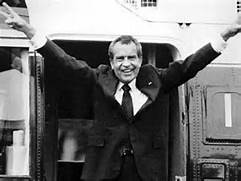 allegiance.’ Who would do that? Who would ask a man to pledge allegiance under oath? I mean think of it, I hardly know the man. It doesn’t make sense.” Because so few commentators found credibility with this statement, we wonder whether or not this was actually planned as a fake news conference. And Trump tweeted that same day: “Despite so many false statements and lies, total and complete vindication.”
allegiance.’ Who would do that? Who would ask a man to pledge allegiance under oath? I mean think of it, I hardly know the man. It doesn’t make sense.” Because so few commentators found credibility with this statement, we wonder whether or not this was actually planned as a fake news conference. And Trump tweeted that same day: “Despite so many false statements and lies, total and complete vindication.”
In any case, this seems to be the closest Trump has come so far to Nixon’s infamous “I’m not a crook” defense on November 17, 1973. That did not work out well for Nixon.
What Remains?
So far, Trump has not cited “Executive Privilege” in any attempt to block the examination of evidence. This could be because he truly believes (rightly or wrongly) he has done nothing wrong, or because someone in his inner circle has given him advice that he actually listened to, or because he believes other measures (such as attacking the integrity of Comey and other potential adversaries) will suffice to keep him safe from, at least, criminal prosecution. It is also possible that others in the administration are prepared to fall on their swords to protect him. Flynn had at one point offered to testify to the House and Senate Intelligence Committees about his connection to Russians in exchange for immunity, but then cited the Fifth Amendment when he either changed his mind or determined that the immunity deal was insufficient. It remains to be unearthed by the Special Counsel, Robert Mueller, when he begins to hold hearings for which he will be able to issue subpoenas. At that point, we would not be surprised to see the Trump administration reaching for Executive Privilege a la Nixon.
Nixon had attempted to use Executive Privilege to block further investigations into Watergate. As everyone knows by now, he failed.
Trump also has not, as of yet, made any moves toward trying to undermine or outright eliminate Robert Mueller from his position as Special Counsel. Despite occasional comments by news analysts that the president has the right to fire a Special Counsel, it was considered highly unlikely that Trump would attempt such a thing. Then, on Monday, June 12, former Republican congressman Newt Gingrich began insisting that Mueller was a partisan actor (in spite of Mueller having served as FBI chief under George W. Bush, and Gingrich’s own endorsement of Mueller at the time he was named Special Counsel by Assistant Attorney General Rosenstein). MSNBC was reporting on June 12 that Trump was “considering perhaps terminating” Mueller. Will Gingrich’s bombast make such an impression on the increasingly-insecure Trump that he will decide to take this final step toward fulfilling Nixon’s legacy?
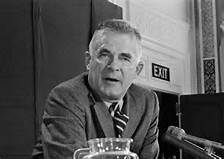 Nixon had used this tactic in 1973 to get rid of Special Prosecutor Archibald Cox. Nixon had attempted to order Cox to cease his pursuit of the White House Tapes, which, as it turned out, held information on White House discussions that would incriminate Nixon and several of his staff. Cox refused to call off his pursuit of the tapes. On Saturday, October 20, 1973, Nixon ordered Attorney General Elliott L. Richardson to fire Cox. Richardson refused and resigned. Nixon then ordered Assistant Attorney General William Ruckleshaus to fire Cox. Ruckleshaus also refused and was either fired or resigned, depending on who one asks. Finally, Nixon turned to the next
Nixon had used this tactic in 1973 to get rid of Special Prosecutor Archibald Cox. Nixon had attempted to order Cox to cease his pursuit of the White House Tapes, which, as it turned out, held information on White House discussions that would incriminate Nixon and several of his staff. Cox refused to call off his pursuit of the tapes. On Saturday, October 20, 1973, Nixon ordered Attorney General Elliott L. Richardson to fire Cox. Richardson refused and resigned. Nixon then ordered Assistant Attorney General William Ruckleshaus to fire Cox. Ruckleshaus also refused and was either fired or resigned, depending on who one asks. Finally, Nixon turned to the next 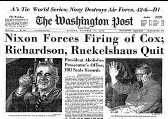 official in line, Solicitor General Robert H. Bork (the future failed Reagan Supreme Court nominee). Bork followed Nixon’s order and fired Cox. The whole affair would come to be known as the “Saturday Night Massacre”. Within a week, polls showed a plurality of Americans supported impeaching Nixon. On November 14, District Judge Gearhard Gessell ruled that the firing of Cox was illegal. Congress became infuriated at what it saw as an abuse of power. And nine months later, on July 27, 1974, the first article of impeachment, charging Nixon with obstruction of justice, was approved by the House Judiciary Committee.
official in line, Solicitor General Robert H. Bork (the future failed Reagan Supreme Court nominee). Bork followed Nixon’s order and fired Cox. The whole affair would come to be known as the “Saturday Night Massacre”. Within a week, polls showed a plurality of Americans supported impeaching Nixon. On November 14, District Judge Gearhard Gessell ruled that the firing of Cox was illegal. Congress became infuriated at what it saw as an abuse of power. And nine months later, on July 27, 1974, the first article of impeachment, charging Nixon with obstruction of justice, was approved by the House Judiciary Committee.
As for Trump, Georgetown Law Professor Paul Butler said on MSNBC June 12 that this would amount to “Watergate on steroids”, and Congressman Adam Schiff (D-California) was quoted as saying, “Don’t waste our time,” as it was speculated that if Trump were to fire Mueller, Congress might simply re-hire him.
There are not many “boxes” left for Trump to “check” before he has completed the process of following the Nixon Watergate recipe. The news tends to move rather quickly with this president. By the time you read these words, the die on the Trump presidency may have already been cast.
